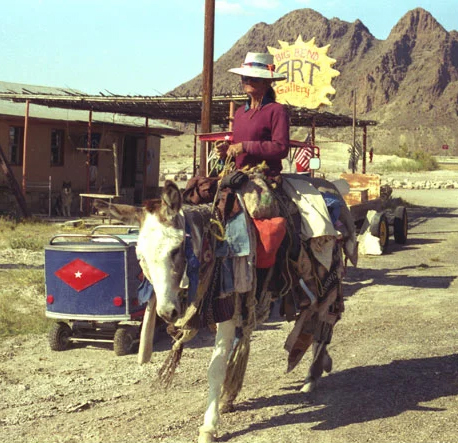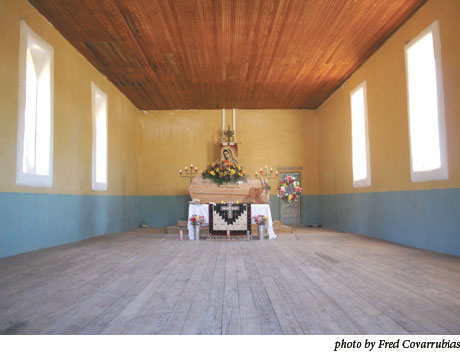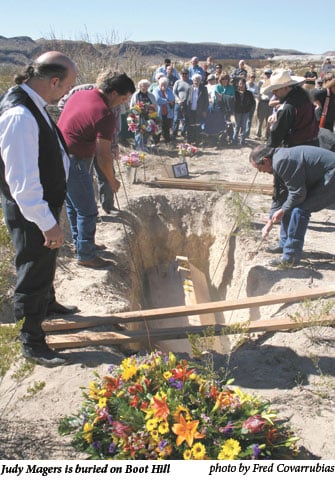
The Mystery Everyone Loved
“She was the most famous unknown person I've ever known.”
Above: The Burro Lady
I.
The burro lady, she’s gone.
II.
Say you were way out in far West Texas, careening down Highway 90 between Marfa and Valentine. It’s empty out here, a big, blazing bowlful of sky, the yellow ocean of grass, those bald, old, old mountains to the left and right. No people, or hardly any. You were in the middle of telling your mom, your friend, your lover—whomever—the kind of story you tell on a road trip. Your eyes light on an unexpected shape on the roadside ahead, and as you get closer, spinning along at 70 mph, you stop talking, your mom or your friend or whoever is looking now, too, at the elephantine hump that’s moving steadily down the bar ditch, and you realize, “Hey, that’s a woman on a burro.”
That was Judy Magers, the burro lady.
III.
In 1982, Bill Ivey ran the Lajitas Trading Post. Back then, before the traditional crossings across the Rio Grande were bulldozed and closed, the post was a hangout and mercantile for Mexican workers going back to San Carlos, Chihuahua, the river-runners who left someplace else for Terlingua, and the tourists who strayed outside the boundaries of Big Bend National Park. That’s when Judy arrived, more or less. She camped on the river at the rafting put-in for Colorado Canyon. She was all alone, and she didn’t speak.
“It took her 45 minutes to work up the courage to ask me for the groceries she wanted,” Ivey recalls. “When she first came, she wouldn’t talk to anybody.”
On January 26 of this year, Ivey learned she’d died that day, at age 65. He was her legal guardian and, arguably, her best friend. But the Big Bend is the edge of the known universe, or at least it can feel that way. We saw her even if she didn’t see us. Judy had more friends than she ever knew.
IV.
Judy lived at the Colorado Canyon camp for a long time, and when the site became part of Big Bend National Park, she moved onto property owned by Ivey. About 5-foot, 3-inches, Judy was skinny as a fence post, and she nearly always wore big, dark glasses and a hat. Behind the glasses, her eyes were a luminous, light blue-green.
“She never would talk about her past to me,” Ivey says. “Not much is known about her.”
Perhaps because of its isolation, people in the Big Bend are unusually tolerant of eccentricities. We’re all we’ve got. If Judy didn’t want to talk, no one pushed her to. If she wanted to live utterly alone, that was her deal. Gradually she became somewhat more social.
Buy a print copy of this story in the Texas Observer Store.
“I was fortunate to see her blossom,” Ivey says. “For years, she wouldn’t talk to anyone but me, but over time, she became more trusting.”
It was in Lajitas, sometime in the ’80s, that she acquired her first burro, and with it she became increasingly nomadic. Her home was the big lonesome. Alone with her burro, she roamed the bar ditches from Terlingua to Marfa and from Marathon to Sierra Blanca. She carried whatever she required on the back of her donkey, and he was ever-laden with a tangled heap of tarps, blankets, trinkets, and utensils.
There seemed to be things, less tangible things, she carried that were heavier than cook pots and blankets. While she occasionally visited a little with friendly folks about saddles or animals, Judy rejected most conversation, certainly with strangers. She traveled a singular path for reasons known only to her, and what secrets she had remained secret.
She earned new names since not many people knew her legal name. Most called her the burro lady. Her bearing in the saddle was erect, almost regal, and the stately image was heightened by the burro’s majestically slow pace. A friend once told me his family called her La Reina, the queen. It was what we called her in my household.
For years this is how it was. She’d spend a winter camped outside Marfa, hang out a few days near Alpine, and next appear 100 miles away at a truck stop in Van Horn. She’d disappear from the area for weeks or months, then be spotted near Deming or Sierra Blanca or Terlingua.
There were rumors: that a child had died, that she was wealthy, that she was the child of a former rodeo star, that she had property near Redford. No one really knew except, perhaps, her burro. La Reina had a series of burros. What she asked of them was tough work, and she’d trade them out when they became too footsore to go on. Mouse colored, chocolate, spotted—some lasted longer than others. Despite the rigors of the job, she and her animals built deep, abiding relationships. One summer she appeared driving a pea-green, 1960s Cadillac. The back end had been cut out somehow, and she’d convinced the burro to hop in and take a ride. Pass by them on the road to Presidio, and she’d be sacked out in the shade of the car, the burro standing crazily in the Cadillac’s trunk.
Mostly, though, it was just her and the donkey. She was in Marfa the day Martha Stewart came to town. Judy had tied the burro to a pole downtown and gone inside the old Winn’s dime-store. I happened upon Martha as she and her entourage discovered the burro. La Reina, at that time, had developed a collection of plastic Pepsi bottles and metal spoons, and dozens of each hung off the burro’s pack. He was tied with bits of string pieced together, and he could’ve walked off anytime he chose. Martha and her friends didn’t mean any harm, but as they fingered the objects on his back, petted him, and posed for pictures, I asked them to move on, and I told them that his owner wouldn’t appreciate their messing with the burro. Sure enough, Judy came hustling out of Winn’s and set about untying the burro in a fury. By the look she threw me—her face suffused with anger and betrayal—I know she didn’t realize I was trying to help.
It’s okay. Lots of people tried to help.
“Everyone I’ve talked to has a story about her, and they’ve all watched after her,” Ivey says.
Judy’s last burro was Merle. A convenience store in Alpine saved up green lollipops that he liked, though that was about as much charity as La Reina could stand. She was regularly offered a place to stay, a warm shower, money, food—but she rarely took anything more than a lift from one place to another. Becky Dean Walker, the county judge in Hudspeth County, rigged a 55-gallon drum of water outside her ranch gate specifically for the burro lady and her donkey.
“Oh you shouldn’t have done that,” Judy told the judge.
Every time La Reina stayed on Walker’s land, she’d sprinkle change at the water drum.
“If I didn’t pick up the change, she wouldn’t water the donkey until I took it,” Walker recalls. “She didn’t want to be a burden.”
This winter was a beast in far West Texas. It snowed, it iced, the wind bullied, and it was just damn cold. In the cafes we wondered, what of La Reina?
V.
Judge Walker’s phone rang. Judy Magers was dead. She had been camped at the roadside in Sierra Blanca. A passerby realized that she’d collapsed to the ground, and he rushed to her side and dialed 911. Help arrived within a minute, but she slipped away. The burro was braying.
“She wasn’t alone when she died,” Walker says.
News of her death rocketed around the Big Bend. Ivey had long ago been established as her official guardian. He helped manage the Social Security checks she relied on, and he went through his records of her, looking for any scrap of information that would lead to a family member. Merle, the burro, went to stay with Walker. He grieved, she says.
“He cried for a day and a half,” Walker recalls. “I’d piled all his blankets in a pen, and he’d look under them for her, moaning. It makes you cry.”
Ivey says Judy had confided to him years before her wish to be buried at Boot Hill, the beautiful and sad cemetery at Terlingua ghost town. She wanted her boots and spurs and her hat. A fund was established to pay for funeral expenses. Suddenly, a revelation. Detective work by friends and a dash of luck led to a daughter in South Dakota, who told of two more daughters, and two sons, and 11 grandchildren. They scrambled onto planes from South Dakota, North Dakota, Arizona, and California. They had not seen their mother in 20 years. As they drove into Terlingua late on Superbowl Sunday, they encountered Ivey, who’d just pulled up with their mother’s casket. Judy’s children carried her coffin into St. Agnes, the church on the hill behind town, and there she lay all night.
VI.
Who knows of loneliness, of hardship? What distances divide us?

VII.
Her sons are dark-headed and handsome. Her daughters have auburn hair, their mother’s bright eyes, and her piercingly intelligent gaze. Sequestered from their mother for decades, they grappled with an astonishing combination of grief, surprise, relief, and probably confusion. Nearly everyone they met knew something of their mother, had seen her countless times camped in the swale with her burro. Her coffin had been donated. Someone found boots, spurs, and a hat when Judy’s own could not be located. Flowers arrived.
February 5 dawned blue-skied and still. La Reina’s coffin lay in the simple little church alone, adorned with an Indian blanket, photographs of her and her burro, candles, and the sunlight that splashed through the building’s open windows and onto its blue-and-yellow walls. It was a scene of great humility and thoughtfulness, and it was silent.
Down at the cemetery, the crowd grew to 150 people. At noon the funeral procession appeared. Followed by a spotted donkey garlanded with flowers and grass, the burro lady’s five children carried her coffin through the creosote to her grave on Boot Hill.
Ivey directed the service.
“She was the most famous unknown person I’ve ever known,” he said. “There’s something deep down that we wanted to feel sorry for Judy—it’s called compassion. But Judy didn’t want us to feel sorry. How can you, for someone who’s doing what they want to do?”
He contemplated the sunset on the day he picked up Judy’s body from the funeral home near El Paso.
“It dawned on me that Judy saw more sunsets than I’ll ever see,” he said. “And she woke to countless sunrises. I am in awe of this sunset. If I slowed myself down to the pace of a burro, think how much more important that sunset would be.”
In the back of the crowd, the spotted burro nibbled on the jacket of his handler. This was not Merle, but a burro representative. He was riderless, and in old military tradition, someone had placed boots backward in his stirrups.
People told stories of her, of where they saw her, of her cussed independence and the impact that her strange, itinerant life had on them. Judy likely had no idea she was beloved by so many. Scores of folks had tried to help her over the years, but were thwarted by her resistance. Now that she was gone, those at the funeral tried to soothe the ache of her children.
“Please don’t be too downhearted,” one woman said. “Judy touched so many hearts. Be happy for that.”
Off and on there was laughter. One man exclaimed that her newly discovered children were now family members to us all, and amens rang out. “Amazing Grace” was sung, and as the crowd got to the third verse, Ivey stepped forward, folded the Indian blanket and handed the children her hat, boots, and spurs. Helpers carefully removed the slats under the coffin and lowered the burro lady into her grave. There were tears.

VIII.
Judy Magers’ children had never been to Texas before. In deference to their mother’s fierce protection of her privacy, no one asked them how this had come to be, how their mother had left them, and why she followed a path so rugged, solitary, and severe.
“We really appreciate how the community looked after her,” her son Clinton Wood said at the potluck after the funeral. “We thank the community for embracing her the way she was. There was no changing her.”
Merle the burro went to California to live with Magers’ son, Clay Gilman. Her children say they may return to Texas, to show Magers’ 11 grandchildren the country that she loved.
IX.
Spring has come and turkey vultures wheel overhead. The burro lady lies in Boot Hill.
The ground is her bed, the sky her blanket, the Chisos her sentinel.
Sterry Butcher is a journalist with the Big Bend Sentinel in Marfa.


